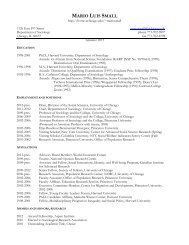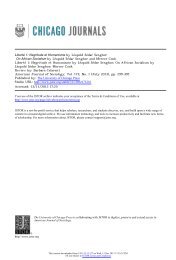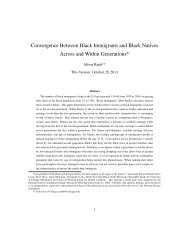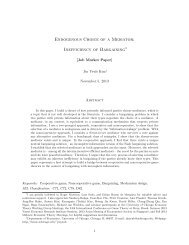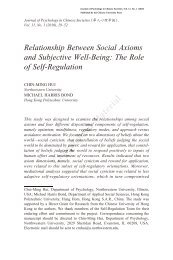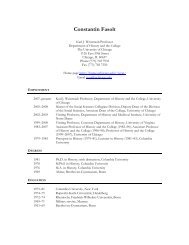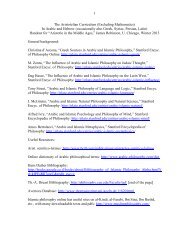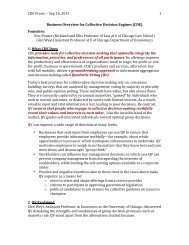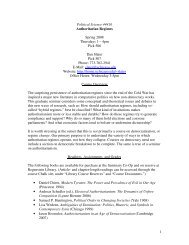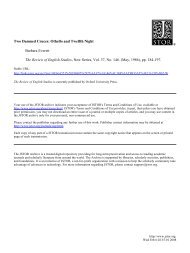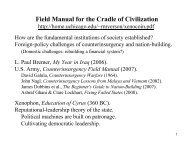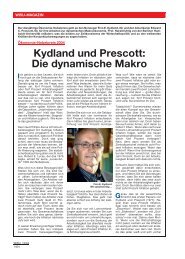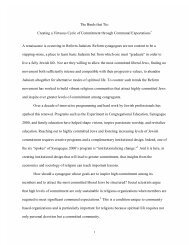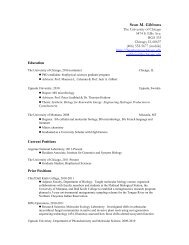Guide to the Study of Early Modern European History For Students ...
Guide to the Study of Early Modern European History For Students ...
Guide to the Study of Early Modern European History For Students ...
Create successful ePaper yourself
Turn your PDF publications into a flip-book with our unique Google optimized e-Paper software.
III. SCOPE OF THE EXAM<br />
In principle, I expect you <strong>to</strong> demonstrate three things: first, that you have traveled<br />
<strong>the</strong> length and breadth <strong>of</strong> early modern Europe far enough <strong>to</strong> be able <strong>to</strong> teach an upper-level<br />
undergraduate course on early modern <strong>European</strong> his<strong>to</strong>ry that meets <strong>the</strong> standards <strong>of</strong> <strong>the</strong> best<br />
liberal arts colleges in <strong>the</strong> country; second, that you are familiar with <strong>the</strong> state <strong>of</strong> <strong>the</strong><br />
scholarship; and third, that you would be able <strong>to</strong> undertake original research in <strong>the</strong> field even<br />
if you have not done so and will never do so. That is perhaps <strong>the</strong> simplest way <strong>to</strong> explain<br />
what it means <strong>to</strong> have a pr<strong>of</strong>essional grasp <strong>of</strong> early modern <strong>European</strong> his<strong>to</strong>ry.<br />
In order <strong>to</strong> develop such a grasp you need <strong>to</strong> have five different kinds <strong>of</strong> knowledge:<br />
1. Broad knowledge <strong>of</strong> early modern <strong>European</strong> his<strong>to</strong>ry as a whole (general<br />
knowledge)<br />
2. Knowledge <strong>of</strong> <strong>the</strong> current state <strong>of</strong> scholarship in at least a few specific areas<br />
(special knowledge)<br />
3. Knowledge <strong>of</strong> <strong>the</strong> sources for <strong>the</strong> period in question (primary sources)<br />
4. Knowledge <strong>of</strong> <strong>the</strong> his<strong>to</strong>riographical context in which his<strong>to</strong>rians were writing in <strong>the</strong><br />
past and are writing <strong>to</strong>day (his<strong>to</strong>riography and <strong>the</strong>ory <strong>of</strong> his<strong>to</strong>ry)<br />
5. Knowledge <strong>of</strong> <strong>the</strong> main his<strong>to</strong>rical dictionaries, guides, handbooks, journals,<br />
bibliographies, catalogs and o<strong>the</strong>r <strong>to</strong>ols <strong>of</strong> research with which <strong>to</strong> deepen<br />
your grasp <strong>of</strong> <strong>the</strong> literature (<strong>to</strong>ols <strong>of</strong> research)<br />
General knowledge is <strong>the</strong> kind that can be found in textbooks, surveys, and o<strong>the</strong>r<br />
standard his<strong>to</strong>rical accounts with a broad scope. It can be assimilated without much<br />
preparation beyond a good general education. Special knowledge is <strong>the</strong> kind that can be<br />
found in pr<strong>of</strong>essional monographs, essays, and articles published in books, edited volumes,<br />
conference proceedings, and his<strong>to</strong>rical journals. They usually presuppose some<br />
understanding <strong>of</strong> <strong>the</strong> debates in which <strong>the</strong> scholars in <strong>the</strong> relevant fields are currently<br />
engaged. The primary sources constitute <strong>the</strong> foundation for all his<strong>to</strong>rical research. They<br />
consist <strong>of</strong> all sorts <strong>of</strong> pieces <strong>of</strong> evidence that may shed light on <strong>the</strong> period in question<br />
because <strong>the</strong>y were produced at that time—not just written sources, but also paintings,<br />
buildings, landscapes, coins, clo<strong>the</strong>s, <strong>to</strong>ols, and so on. They can be found in archives,<br />
libraries, and museums, ei<strong>the</strong>r in <strong>the</strong>ir original form or in reproductions such as facsimiles,<br />
copies, critical editions, and translations. Usually <strong>the</strong>y cannot be unders<strong>to</strong>od without some<br />
kind <strong>of</strong> technical knowledge, such as knowledge <strong>of</strong> <strong>the</strong> language in which <strong>the</strong>y were written<br />
or mastery <strong>of</strong> skills like diplomatics, paleography, numismatics, and so on. Knowledge <strong>of</strong> <strong>the</strong><br />
his<strong>to</strong>riographical context can be found in books and articles about <strong>the</strong> work that<br />
his<strong>to</strong>rians have done in <strong>the</strong> past, especially in <strong>the</strong> reviews <strong>of</strong> his<strong>to</strong>rical scholarship that are<br />
constantly appearing in pr<strong>of</strong>essional journals. It is something that I stress because I do not<br />
believe that his<strong>to</strong>rians can understand <strong>the</strong> significance <strong>of</strong> <strong>the</strong>ir work unless <strong>the</strong>y understand<br />
<strong>the</strong> relationship in which it stands <strong>to</strong> <strong>the</strong> work that o<strong>the</strong>r his<strong>to</strong>rians have done before <strong>the</strong>m<br />
and <strong>the</strong> reasons why <strong>the</strong>y have done that work. The <strong>to</strong>ols <strong>of</strong> research consist <strong>of</strong> a<br />
tremendous variety <strong>of</strong> dictionaries, guides, encyclopedias, compendia, handbooks, journals,<br />
current bibliographies, restrospective bibliographies, catalogs, and so on (now constantly<br />
being increased by material that is accessible online) intended <strong>to</strong> make it easier for scholars<br />
<strong>to</strong> find <strong>the</strong> information <strong>the</strong>y are looking for.<br />
6<br />
6



